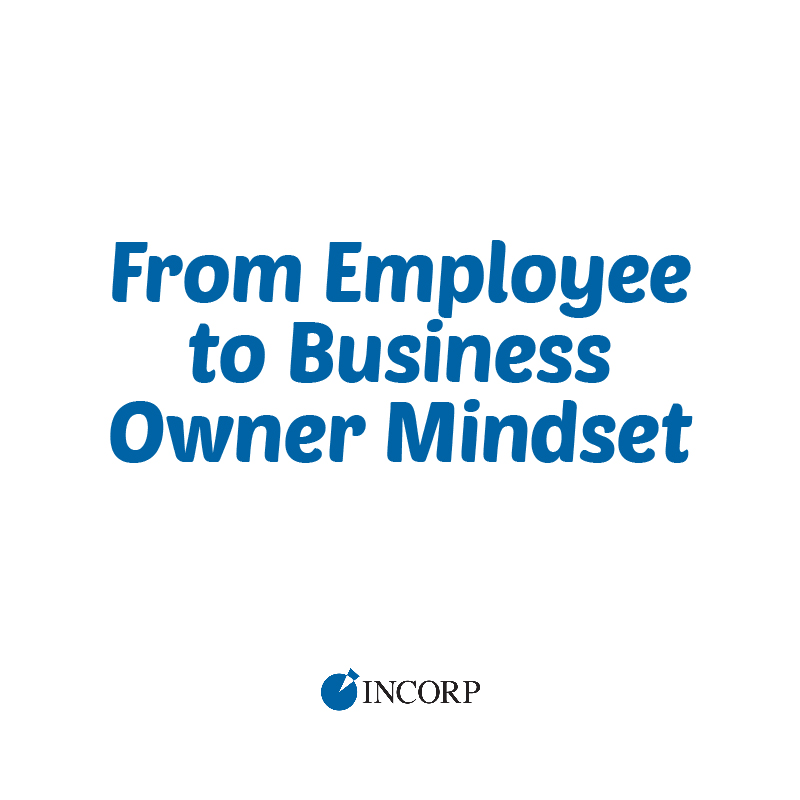Stay in the know!
Join our newsletter for special offers.
You've been successful in a career as an employee, and now you're ready to make the move to business ownership. Congratulations! You've probably done enough research to know what actions you need to take, but developing an entrepreneurial mindset is just as important. The very ways of thinking that helped you succeed as an employee may trip you up as a business owner because being your own boss requires a totally different mental attitude.
Even if you're a sole proprietor or a freelancer, your first step is to start thinking of yourself as a business, not as an individual. Set up a detailed business plan, complete with projected financial statements and estimates of future cash flow. Set your business up as a corporation to protect your personal assets. Then get all the proper licenses and permits and establish bank accounts in your business name. This will put you in the right frame of mind to start thinking like a business owner.
Employees do the tasks assigned to them without thinking about how they affect their employer's bottom line or how much of a return the company is getting on their investment of time and effort. As a business owner, you need to focus on the "big picture" instead of on moving things from your inbox to your outbox. Before doing anything, ask yourself if it's helping you reach the targets you set out in your business plan.
Managers set goals and standards for their staff, and then evaluate employees on a regular basis. You'll need to set your own goals for each day, each week, and each month. Measure your progress, and adjust your activities if you're not getting the results you want.
Taking risks or "rocking the boat" can get an employee in serious trouble, especially if his plan fails to produce results. Business owners sometimes need to break a few rules, defy conventional wisdom, and take big chances to win big. Be willing to take risks, accept failure if and when it comes, and learn from it.
Employees are notoriously change-averse. Making a major shift in company policies and procedures can be as slow and cumbersome as turning a battleship. Entrepreneurs need to be willing and even eager to embrace change--to take advantage of an unexpected opportunity or to adapt to changing market conditions or new technology.
Employees are clock-watchers who can't wait for the weekend. You have to be willing to work more hours than you did as an employee and to sacrifice "work-life balance" in the short term if necessary in order to achieve long-term success.
The good news is that you can make your own schedule. The bad news is also that you can make your own schedule. It's tempting to only work when you feel like it or to get distracted by daily chores. Keeping your daily and weekly goals top-of-mind should help you discipline yourself in the beginning until you develop good work habits.
When you're first starting out, you'll be your own purchasing agent, human resources department, janitor, and marketing department. If you don't know how to do what will be required of you, put in the time it takes to learn or ask for help from a trusted mentor.
In a large company, it may be easy for an employee to evade responsibility by blaming co-workers, lack of communication, or insufficient directions from the chain of command. Business owners can't accept excuses. Take responsibility for errors, delays, or whatever other problems come your way. That's why they call it "taking ownership" of a problem.
Keeping the big picture in mind may sometimes mean sacrificing perfection. An employee may be able to spend hours revising a document or reworking a plan, but a business owner probably doesn't have the luxury of spending the time to achieve 100% perfection in every case. It may be necessary to do the best you can on a task and then move on to something more important. Laser focus may also mean learning to say no to activities that don't help you reach your goal. As an employee, you probably learned to accept whatever tasks were assigned by management, but as an entrepreneur, you should evaluate every added duty (either for your business or in your personal life) before agreeing to it. Don't take on more jobs than you can efficiently handle, and don't let yourself get talked into volunteering to be treasurer of your service club.
Laser focus may also mean learning to say no to activities that don't help you reach your goal. As an employee, you probably learned to accept whatever tasks were assigned by management, but as an entrepreneur, you should evaluate every added duty (either for your business or in your personal life) before agreeing to it. Don't take on more jobs than you can efficiently handle, and don't let yourself get talked into volunteering to be treasurer of your service club.
If changing your mindset seems like a lot of hard work, you're right. The secret to making it all worthwhile is to develop a passion for your company. Employees only get excited about collecting their paychecks or going on vacation, but as a business owner, you need to envision and get excited about the bright future your business can create for you and your family. Your passion and enthusiasm will be the fuel that allows you to do whatever is necessary to achieve your goals.
Join our newsletter for special offers.
